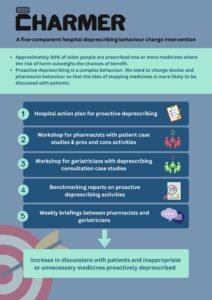
Funded by the National Institute for Health and Care Research (NIHR), the CHARMER team have worked with healthcare professionals and older people, a patient group undoubtedly under-served by clinical research, to develop an approach to support geriatricians (hospital doctors who care for older people) and pharmacists to undertake more proactive deprescribing with older people whilst they are in hospital. Proactive deprescribing refers to stopping medicines before they cause harm. This is in contrast to reactive deprescribing, which is stopping a medicine in response to present harm, e.g., when side effects of a medicine cause a person to fall.
Why is the CHARMER trial important?
Stopping is always more difficult than starting something and this is especially true for medicines, often started years ago by one health professional and tricky for someone else to review years later. Many older people find themselves taking five or more prescribed medicines (called polypharmacy), in part due to people being treated simultaneously for multiple conditions. But as we age our bodies become less able to handle some medicines, and medicines that were once effective and safe may not have as much benefit and an increased chance of causing harm.
In previous research by members of the CHARMER team, older people and their carers told us that they would like their medicines reviewed by doctors during their hospital stay. They would like those medicines that are no longer needed or that could cause harm, to be stopped. However, for a variety of reasons this does not routinely happen.
Less than one percent of these medicines are stopped during hospital admission and most medicines are only stopped after they have caused harm (reactive deprescribing). So, while the principle of proactive deprescribing is an expectation of good prescribing practice, it doesn’t happen as often as it could.
The World Health Organisation’s initiative Medication Without Harm has proposed proactive deprescribing as a potential solution to reducing medicine-related harm. The CHARMER trial aims to incorporate proactive deprescribing as a routine aspect of care in Older People’s Medicine wards. This is critical if we are to tackle overprescribing, improve patient safety and address inappropriate polypharmacy among older people.
How was the CHARMER approach developed?
The CHARMER team worked with geriatricians and pharmacists to explore the reasons for this and identified several barriers, including concerns about the risks of proactive deprescribing, and the misconception that patients and their carers are resistant to having medicines stopped. They also told us that introducing some form of incentive would help them to proactively deprescribe.
The team has since worked with geriatricians, pharmacists, other hospital staff (e.g., Improvement Managers) and older people to identify and design the strategies to encourage more proactive deprescribing. These strategies are known as Behaviour Change Techniques and are the ‘active ingredients’ that are responsible for bringing about change in behaviour.
The CHARMER approach comprises five components – see the Figure for an overview.

We used a ‘co-design’ method to design the CHARMER approach, which means we actively included the people who will deliver the intervention (healthcare professionals) and people who will receive the intervention (older people, our Patient and Public Involvement members) in the design process. This is reflective of the collaborative approach the CHARMER programme has adopted since its inception. As noted, older people are under-served by clinical research and CHARMER has made a concerted effort to involve public and patient representatives in all CHARMER study activities, including as co-applicants. We have five public and patient involvement members working on the study, with their focus on providing input into patient-facing documents and processes.
What will happen during the CHARMER trial?
The CHARMER approach will be tested in a stepped wedge trial in hospitals across England. In a stepped wedge trial, all participating hospitals begin at the same time (1 February 2024) and will act as both a control and intervention (CHARMER approach) site. Hospitals will be randomized into ‘steps’ and each step will introduce the CHARMER approach at different time points and continue with the approach until the end of the trial. Overall, the CHARMER trial will involve approximately 100 geriatricians and pharmacists and include data from over 20,000 older patients across 24 hospitals.
During the trial we will collect information to enable us to understand key aspects of the intervention, how it is delivered, and whether it works. We will also collect information to see whether the intervention is a good use of NHS money and whether doctors, pharmacists, patients and carers find the intervention acceptable.
What will happen after the CHARMER trial?
Our work and findings must be used to inform NHS policy and practice when it comes to tackling overprescribing and improving patient safety.
If the trial shows the CHARMER approach to be acceptable, safe and cost-effective, we will look to roll out the approach nationally to:
- Improve patient safety: older people will have fewer medicines to take daily, potentially improving their quality of life.
- Tackle overprescribing and save patients and the NHS money: the cost benefits that may be associated with proactive deprescribing include fewer hospital admissions and patients saving money on ordering unnecessary prescriptions.
You can find out more information about the CHARMER trial here:
Comments